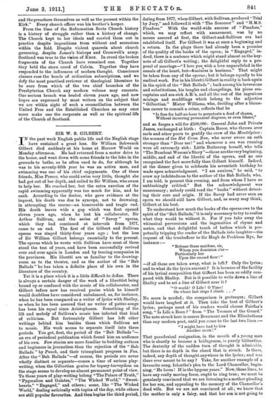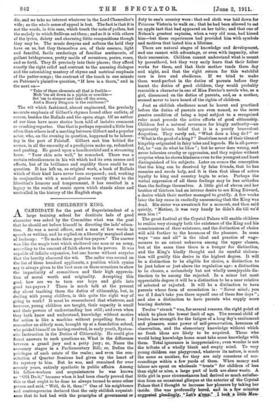SIR W. S. GILBERT.
IN the past week English public life and the English stage have sustained a great loss. Sir William Schwenck Gilbert died suddenly at his home at Harrow Weald on Monday afternoon. He had returned from a motor drive to
the house, and went down with some friends to the lake in the grounds to bathe, as he often used to do, for although he
was in his seventy-fifth year he was an active man, and
swimming was one of his chief enjoyments. One of these friends, Miss Preece, who could swim very little, thought she had got out of her depth, and called to Sir William, who swam to help her. He reached her, but the extra exertion of the rapid swimming apparently was too much for him, and he sank. According to the doctor, who gave evidence at the inquest, his death was due to syncope, not to drowning, in attempting the rescue—an honourable and tragic end.
His death leaves wide a gap which was first opened eleven years ago, when he lost his collaborator, Sir Arthur Sullivan, and the series of " Savoy " operas, which they had continued at intervals from 1877, came to an end. The first of the Gilbert and Sullivan operas was staged thirty-four years ago ; but the loss of Sir William Gilbert belongs essentially to the present.
The operas which he wrote with Sullivan have most of them stood the test of years, and have been successfully revived
over and over again in London and by touring companies in the provinces. His libretti are as familiar to the drawing- room as to the theatre, and as the author of the "Bab Ballads" he has taken a definite place of his own in the literature of the country.
Yet it is a place which it is a little difficult to define. There is always a certain danger of the work of a librettist being bound up or confused with the music of his collaborator, and Gilbert before now has received praise which he himself would doubtless have considered unbalanced, as, for instance, when he has been compared as a writer of lyrics with Shelley, or when he has been assured that no writer of patter-songs has been his equal since Aristophanes. Something of the lilt and melody of Sullivan's music has infected that kind of criticism. But fortunately Gilbert has left other writings behind him besides those which Sullivan set to music. His work seems to separate itself into three periods. You get, first, the period of the "Bab Ballads "- an era of periodical publication which found him an audience
of his own. Few stories are more familiar to budding authors and beginners in journalism than the rejection of the "Bab Ballads " by Punch, and their triumphant progress in Fun. After the "Bab Ballads "—of course, the periods are never wholly distinct or separate—comes a time of serious play- writing, when the Gilbertian genius for topsey-turveydom on the stage seems to develop an almost permanent point of view. To these years of play-writing belong "The Palace of Truth," "Pygmalion and Galatea," "The Wicked World," "Sweet- hearts," "Engaged," and others ; some, like "The Wicked World," dealing satirically with topics of the day, while others are still popular favourites. And then begins the third period,
dating from 1877, when Gilbert, with Sullivan, produced "Trial by Jury," and followed it with "The Sorcerer" and "H.M.S. Pinafore." With the world-wide success of "Pinafore," which, we may reflect with amazement, was by no means assured at first, the Gilbert-and-Sullivan era had established itself. For Gilbert it was at once a beginning and a return. In the plays there had already been a promise of the quality of the books of the opera; in "Engaged," in- deed, there is a sentence which might stand almost as the key- note of all Gilbert's writing ; the delightful reply to a pro- posal of marriage—" I love youwith a love unparalleled in the annals of the heart, but—business is business." That might be taken from any of the operas ; but it belongs equally to his earliest work. For in his libretti Gilbert in reality is back again in the spirit of the "Bab Ballads " ; back among his inversions and substitutions, his tangles and changelings, his pious sea- captains and sea-sick A.B.'s, and all the rest of the ingenious mixings and muddlings which belong to the adjective " Gilbertian." Mister Williams, who, deciding after a blame- less career to commit a crime, reflects that he "Is free for half-an-hour to perpetrate a deed of shame, Without incurring permanent disgrace, or oven blame," and so forges a will for 2500,000: General John and Private James, exchanged at birth : Captain Reece, who throws over
earls and other peers to gratify the crew of the Mantelpiece : the seamen of the Hot Cross Bun, who never swore an oath
stronger than "Dear me!" and whenever a sea was running were all extremely sick: Little Buttercup herself, who tells "The Bumboat Woman's Story "—those are the very beginning, middle, and end of the libretti of the operas, and go one recognised the fact more fully than Gilbert himself. Indeed,
at the dinner given to celebrate his seventieth birthday he made open acknowledgment. "I am anxious," he said, "to avow my indebtedness to the author of the Bab Ballads, who, I am told, is present this evening, and from whom I have so unblushingly cribbed." But the acknowledgment was unnecessary ; nobody could read the " books " without detect- ing their core and origin. If the Savoy had never seen an opera we should still have Gilbert, and, as many may think,
Gilbert at his best.
To understand how much the books of the operas owe to the spirit of the "Bab Ballads," it is only necessary to try to realize what they would be without it. For if you take away the whimsical perversions and the ingenuities of rhyme and metre, and that delightful touch of bathos which is per- petually tripping the reader of the Ballads into laughter—the request of the troubadour to Sir Hugh de Peckham Rye, for instance :— "Release these maidens, sir, Whom you dominion o'er— Particularly her Upon the second floor!"
—if all these are taken away, what is left? Only the lyrics; and to what do the lyrics amount ? It is because of the facility of his lyrical composition that Gilbert has been so oddly com- pared with Shelley. But is it possible to write down a line of Shelley and to set a line of Gilbert near it ?
."O world! 0 Life ! 0 Time!
On whose last steps I climb. . . ."
No more is needed ; the comparison is grotesque ; Gilbert would have laughed at it. Then take the best of Gilbert's lyrics; perhaps most of his readers would choose Fairfax's song, "Is Life a Boon?" from "The Yeomen of the Guard." The note struck here is nearer Beaumont and the Elizabethans than any modern poet, until you come to the last two lines :— "I might have had to live Another morn
That paradoxical resignation, in the mouth of a young man who is shortly to become a bridegroom, is purely Gilbertian. The dexterity of the sudden turn of thought is admirable, but there is no depth in the chord that is struck. Is there, indeed, any depth of thought anywhere in the lyrics ; and was there ever meant to be any ? Take, for another example of a favourite song, Iolanthe's plea to the Lord Chancellor, begin. ning, "He loves If in the bygone years." Now, those lines, to have any really moving force, ought to ring true ; we must be genuinely convinced that we are listening to a mother pleading for her son, and appealing to the memory of the Chancellor's dead wife. But we are, not convinced at all; we know that the mother is only a fairy, and that her son is not going to
die, and we take no interest whatever in the Lord Chancellor's
wife; so the whole sense of appeal is lost. The fact is that it is not the words, in this case, which touch the note of pathos, but the melody to which Sullivan set them; and so it is with others of the lyrics, dainty and charming little compositions though they may be. The music deepens and softens the hold they have on us, but they themselves are, of their essence, light and fanciful, facile renderings of familiar sentiments, of gallant bridegrooms, pretty maids of seventeen, posies, roses, and so forth. They fit precisely into their places; they afford exactly the right relief and contrast to the amusing dialogue and the astonishing mastery of rhyme and metrical emphasis of the patter-songs ; the contrast of the touch in one minute on Patience's plaintive question, "If love is a thorn," and in the next on—
"Take of these elements all that is fusible— Melt 'em all down in a pipkin or crucible— Set 'em to simmer and take off the scum, And a Heavy Dragoon is the residuum!"
The wit which fashioned, almost engineered, the precisely accurate emphasis of Gilbert's rhymes found other outlets, of course, besides the Ballads and the opera stage. Of no author of our time have more stories been told of incisive comment or crushing repartee. One that is perhaps repeated a little less often than others is of a meeting between Gilbert and a popular actor, who, on the evening in question, happened to be labour- ing in the part of Falstaff. Gilbert met him behind the scenes, in all the enormity of a prodigious make-up, redundant and panting. He gazed upon a handkerchief and a streaming brow. "Your skin acts well," he remarked. There was a
certain relentlessness in his wit which had its own causes and effects, but of its brilliance and rapidity there could be no question. It has left us, as original work, a book of Ballads which of their kind have never been surpassed; and, working
in conjunction with a musical genius exactly fitted to the librettist's humour and temperament, it has resulted in a legacy to the realm of comic opera which stands alone and unrivalled in the history of the English stage.







































 Previous page
Previous page